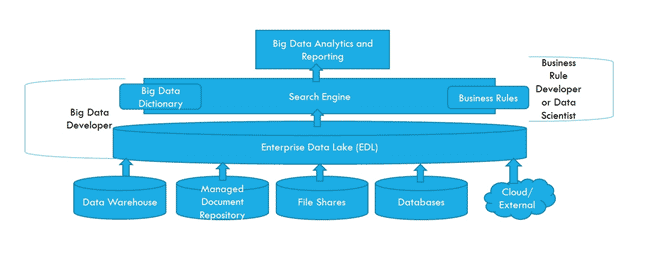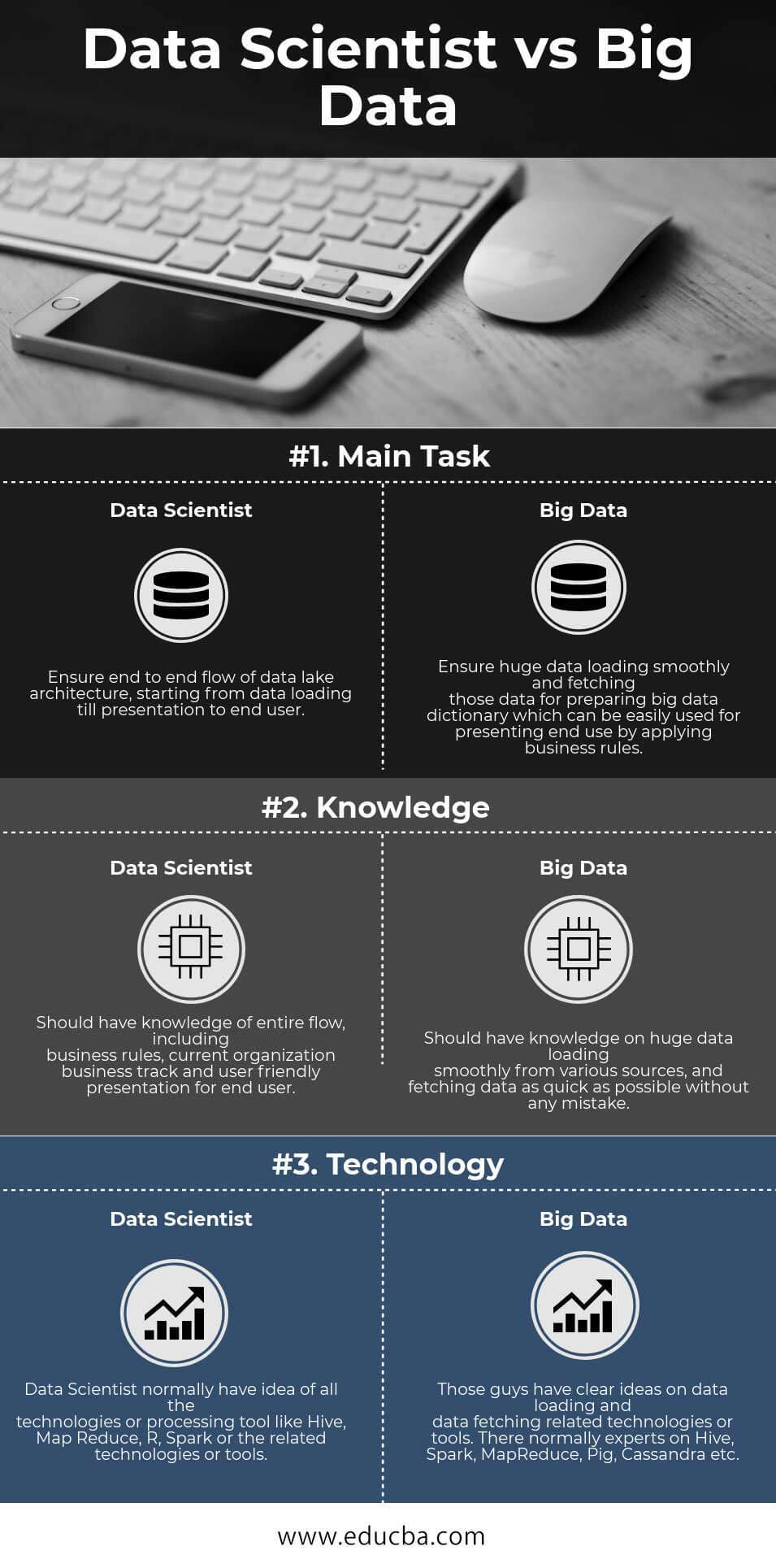Differences Between Data Scientist vs Big Data
Data Scientist knows the entire flow of complete data lake architecture, starting from data loading till the presentation of an end-user. Data scientists execute and develop the data flow from the beginning of data loading until the end-user gets the appropriate data in a presentation format. In comparison, big data is one of the parts of the entire architecture. Big data is limited to loading, fetching, and preparing data dictionary tasks. Big data ensures that the data that is loading and fetching is a part of preparing the expected data dictionary.
Data Lifecycle 
- Massive data came from varieties sources like Data Warehouse tools, Managed Document Repositories, File Shares, Databases, and Cloud or External.
- Data has been loaded into the HDFS system called Enterprise Data Lake. It can need to learn at the time of understanding big data. How that loaded and how it stores.
- After data is loaded successfully, there have several methods to pick those data and create one that requires an extensive data dictionary. One very popular is Hive, which handles loading the data as a similar table and supports HiveQL (an SQL-like language). It internally used a map-reduce program, which is essential to learn for understanding big data.
- Now there has one other prospect to create business rules which will use an extensive data dictionary for analytics and reporting purposes. These business rules were written by business rule developers, who are mainly experts in statistics and mathematics and have an excellent understanding of the current business of that organization, including predictive calculation.
- Now business rules and extensive data dictionaries are both ready. Now the task for the report developer. They designed reporting structures with different views based on rules defined by business rule developers using an extensive data dictionary. The report can be easily accessible and provide a prospect for that organization.
Head to Head Comparison Between Data Scientist vs Big Data
Below is the top 3 comparison between Data Scientist and Big Data:
Key Differences Between Data Scientist and Big Data
Some key differences are explained below between Data Scientist and Big Data:
- For improving system performance to end-user on presentation, data scientists mainly depend on big data people, as maximum performance tuning can be possible on the data fetching part. In comparison, big data people are fully responsible for data or speed optimization at the point of data loading and data fetching logic. People are usually involved in tuning on a map-reduce task or moving the entire setup to the hive or spark based on data volume or organization requirements.
- Data scientists must have explicit knowledge of any organization’s business requirements to help prepare business rules or presentation logic. They are the key to providing a reasonable probability of organizational growth based on their business performance or current activity. At the same time, big data guys can learn about organization business or presentation logic without knowing about organization business or presentation logic. Those guys mainly concentrate on how data from various sources load smoothly, and fetching can be faster for preparing a data dictionary.
- Data scientists usually have basic knowledge of the HDFS system setup. Whereas the big data guy knows about the entire structure of the HDFS system, whether they involve as admin on that task or not. Working with performance tuning on data loading or fetching is related to that system setup. An increasing number of the system will automatically impact the performance of data loading or fetching. But everything depends on how much data is required for that organization which Data Scientist again decides.
- Rule development is one of the critical tasks for a data scientist, whereas big data guys can easily avoid that one.
Data Scientist vs Big Data Comparison Table
Below is the Comparison table between Data Scientists and Big Data.
| Basis of Comparison | Data Scientist | Big Data |
| Main Task | Ensure end-to-end the flow of data lake architecture, starting from data loading till presentation to end-user. | Ensure huge data loading smoothly and fetching those data for preparing a big data dictionary, which can be easily used for presenting end-use by applying business rules. |
| Knowledge | We should have knowledge of the entire flow, including business rules, current organization business track, and user-friendly presentation for an end-user. | Should have knowledge of huge data loading smoothly from various sources and fetching data as quickly as possible without any mistakes. |
| Technology | Data Scientist normally has an idea of all the technologies or processing tools like Hive, Map Reduce, R, Spark, or related technologies or tools. | Those guys have clear ideas on data loading and data fetching-related technologies or tools. There are normally experts on Hive, Spark, MapReduce, Pig, Cassandra, etc. |
Conclusion
Data Scientist vs Big Data is a similar kind of specialist who helps to transfer data (came from various sources) in a presentable format which gives proper identification or guidance to that specific organization about their probability of future growth or improvement points.
So, in conclusion, data science can have knowledge of entire sections
- Hadoop Admin (for setting up the HDFS system)
- Big Data Developer (responsible for loading data and preparing a dictionary by fetching those huge data)
- Business Rule Developer (responsible for developing business rules)
- Report Developer (design and presentation to end-user)
And big data developers have the knowledge below:
- The process of data loading from various types of resources.
- Accepting structured and unstructured data and managing to load those data based on system requirements.
- Full knowledge of HDFS and Map-Reduce programming.
- Knowledge of updated data engines like Hive or Spark.
- Very much involved in data optimization based on the requirement of the end-user.
- One of the key members for ensuring data flow of the entire data flow architecture.
Recommended Articles
We hope that this EDUCBA information on “Data Scientist vs Big Data” was beneficial to you. You can view EDUCBA’s recommended articles for more information.

